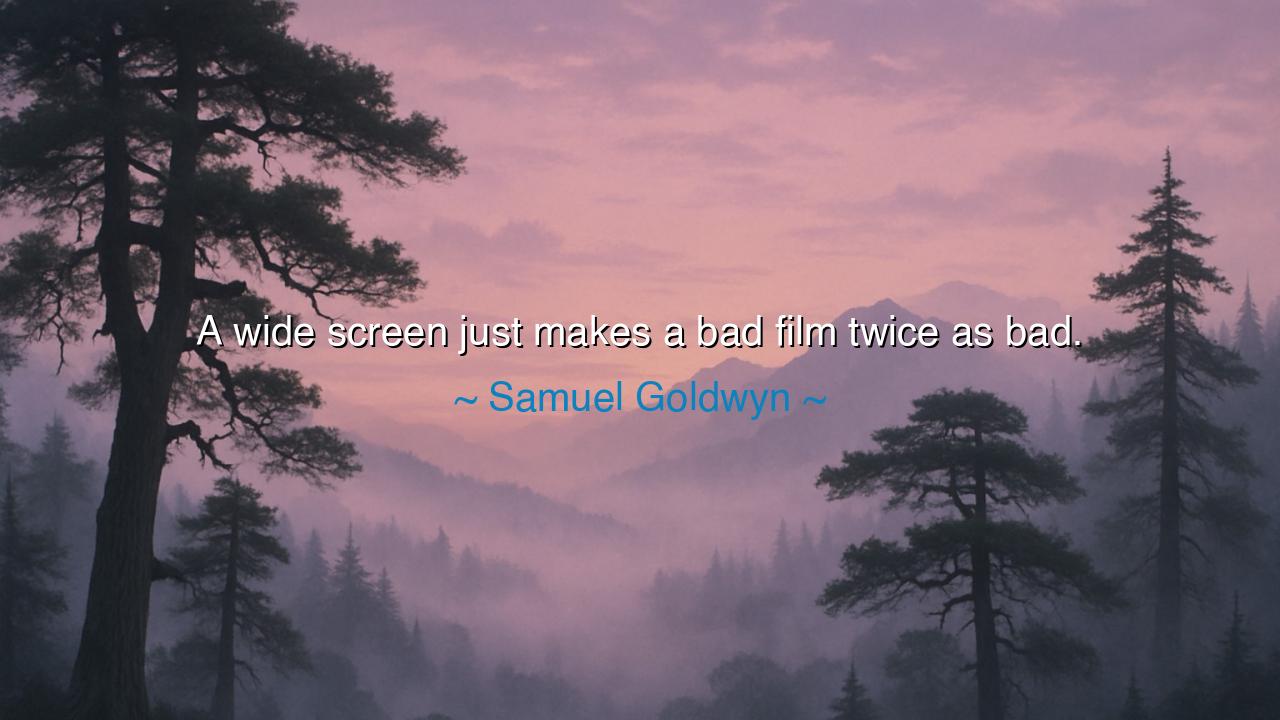
A wide screen just makes a bad film twice as bad.






Samuel Goldwyn, titan of Hollywood and master of sharp wit, once proclaimed: “A wide screen just makes a bad film twice as bad.” Though he spoke in jest, there is truth in this piercing remark. For no grandeur of surface, no size of canvas, no glittering spectacle can conceal the emptiness of a hollow work. To enlarge mediocrity is not to transform it, but to expose it more cruelly. Goldwyn reminds us that substance is the soul of art, and that form alone cannot redeem what is false, shallow, or carelessly made.
The ancients understood this lesson long before cinema. The great orators of Greece and Rome knew that eloquence without truth was but noise echoing in the marketplace. Demosthenes could thunder forth with passion, but if his words lacked weight, they would dissolve like mist in the morning sun. Cicero himself warned that “ornament without wisdom” is nothing but a mask. Goldwyn’s wide screen is but the modern version of this ancient temptation — to think that splendor of presentation can hide the poverty of content.
History also teaches us how spectacle without substance falls into ruin. Consider the decline of the Roman Empire. The emperors, desperate to appease the masses, built ever-larger arenas, ever-grander games. The Colosseum itself was a kind of “wide screen,” a vast stage for blood and spectacle. Yet beneath the grandeur lay corruption, hunger, and decay. The wider the spectacle, the clearer the emptiness became. Bread and circuses could not hide the sickness of the state. So too does Goldwyn warn: no magnitude of screen can redeem the emptiness of a poorly wrought story.
In the world of cinema, we see the same truth repeated. Films adorned with dazzling effects but empty of soul fade quickly from memory, no matter how vast the budget or how wide the screen. Yet a small, simple story — told with truth, with care, with humanity — can endure across generations. Consider the contrast: a towering spectacle forgotten in a year, while films like Casablanca, born of modest production, continue to move hearts for decades. The frame may change, but it is the story that endures.
Goldwyn’s words are not only for artists but for all who live. How often do men and women try to enlarge the surface of their lives — gathering wealth, displaying grandeur, pursuing recognition — while neglecting the core of character and virtue? To expand emptiness is to make emptiness more visible. To magnify weakness is to invite greater shame. The lesson of the wide screen is eternal: polish cannot hide hollowness; size cannot substitute for substance.
The practical action is this: labor first on the foundation. If you build a speech, let it be true before it is eloquent. If you craft a work, let it be honest before it is grand. If you live your life, let it be virtuous before it is magnificent. Seek not to enlarge what is unworthy, but to strengthen what is real. For when the substance is strong, even the smallest frame will shine with greatness; but when it is hollow, no wide screen will save it.
So, O seekers of wisdom, heed Goldwyn’s jest as prophecy: do not mistake breadth for depth, nor spectacle for truth. Build your works and your lives upon the firm soil of substance, and let form be the vessel, not the master. For when the heart of a thing is true, it needs no enlargement to endure; but when it is false, every enlargement only hastens its ruin. Thus let your story, your labor, your very soul, be made worthy first — and then, whether framed small or vast, it shall shine with the light of eternity.






AAdministratorAdministrator
Welcome, honored guests. Please leave a comment, we will respond soon